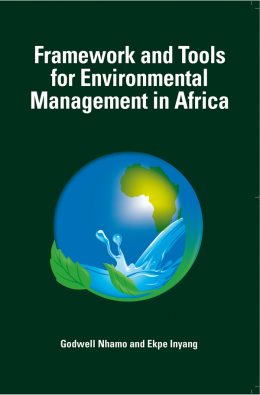Framework and Tools for Environmental Management in Africa
Keywords:
Framework, Tools, Environmental , Management, AfricaSynopsis
The 21st century qualifies as one in which humanity raised environmental decay, especially climate change, as a key global concern requiring urgent political attention. The book Framework and Tools for Environmental Management in Africa is written from this perspective. It provides researchers from different disciplines including environmental sciences, engineering, commerce, planning, education, agriculture and law, as well as NGOs, government officials, policy makers and researchers, with a platform to engage with concerns relating to sustainable environmental management in this epoch. Topics covered include global landmarks for environmental governance, environmental management on African agenda, sustainability reporting, environmental impact assessment and public participation as well as environmental education. These remain viable in the African set-up where major development projects in mining and agriculture require greater scrutiny. With a collection of both revision and critical reflection questions, carefully constructed by authors with significant experiences from institutions of higher learning across Africa, readers will find this publication a valuable addition to their shelves.
Downloads
References
Agrawala, S., 2005, ‘Putting Climate Change in the Development Mainstream: Introduction and Framework’, in Agrawala, A., Bridge Over Troubled Waters: Linking Climate Change and Development, Paris: OECD, pp. 85–132.
Agrawala, S., Gigli, S. and Raksakulthai, V., et al., 2005, ‘Climate Change and Natural Re- source Management: Key Themes from Case Studies, in Agrawala, S., Bridge Over Trou- bled Waters: Linking Climate Change and Development, Paris: OECD, pp. 85–132.
Ahmad, B. and Wood, C., 2002, ‘A Comparative Evaluation of the EIA Systems in Egypt, Turkey and Tunisia’, Environmental Impact Assessment Review, Vol. 22, pp. 213–234.
Baumert, K., Pershing, J., et al., 2004, Climate Data: Insights and Observations, Washington DC: Pew Centre on Climate Change.
Commonwealth Secretariat, 1996, Women and Natural Resource Management: An Over- view of a Pan-commonwealth Training Manual, London: Commonwealth Secretariat.
DEAT, 2004, Environmental Impact Assessment Regulations, Pretoria: Government Printer. Durning, A., 1992, How Much is Enough? The Consumer Society and the Future of the Earth, New York: W.W. Norton and Company.
El-Fadl, K. and El-Fadel, M., 2004, ‘Comparative Assessment of EIA Systems in MEAN Countries: Challenges and Prospects’, Environmental Impact Assessment Review, Vol. 24, pp. 553–93.
Hardin, G., 1968, ‘The Tragedy of the Commons’, Science, Vol. 162, pp. 1243–48. Hunter, M.L., 1996, Fundamentals of Conservation Biology, Oxford: Blackwell Science. Inyang, E., 2005, Towards Effective and Efficient Rumpi Project [unpublished].
Kakonge, J.O., 1993, ‘Constraints on Implementing Environmental Impact Assessments in Africa’, Environmental Impact Assessment Review, Vol. 13, pp. 299–308.
Kakonge, J.O., 1994, ‘Monitoring of Environmental Impact Assessments in Africa’, Envi- ronmental Impact Assessment Review, Vol. 14, pp. 295–304.
Kakonge, J.O., 1998, ‘EIA and Good Governance: Issues and Lessons from Africa’, Envi- ronmental Impact Assessment Review, Vol.18, pp. 289–305.
Martin, P., 1990b, First Steps to Sustainability: The School Curriculum and the Environment, Surrey: WWF.
Patterson, T.E., 1993, The American Democracy, New York: McGraw-Hill.
SAIEA, 2004, Environmental Impact Assessment in Southern Africa: Summary Report, Windhoek: Southern African Institute for Environmental Assessment.
Schneider, H., Vinke, J. and Weekes-Vagliani, W., eds., 1993, Environmental Education: An Approach to Sustainable Development, Paris: Organisation for Economic Co-operation and Development, pp. 147–57.
Shimada, K., 2004, ‘The Legacy of the Kyoto Protocol: Its Role as the Rulebook for an International Climate Framework’, International Review for Environmental Strategies, Vol. 5, No, 1, pp. 3–14, Kamiyamaguchi: Institute for Global Environmental Strategies.
Struhsaker, T.T., 1998, Ecology of an African rain forest: Logging in Kibale and the Conflict between Conservation and Exploitation, Gainesville: University Press of Florida.
Tarr, P., ‘EIA in Southern Africa: Summary and Future Focus’, in P. Tarr, ed., Environmental Impact Assessment in Southern Africa, Windhoek: Southern African Institute for Environ- mental Assessment, pp. 329–337, 2003.
Umozurike, U. O., 1995, Introduction to International Law, Ibadan: Spectrum.
United Nations, 2005, Kyoto Protocol to the United Nations Framework Convention on Climate Change, United Nations University Press.
Weaver, A.V.B., Greling, T. and Wilgen, Van Wilgen, B.W., 1996, ‘Logistics and Team Man- agement of a Large Environmental Impact Assessment: Proposed Dune Mining at St. Lucia, South Africa’, Environmental Impact Assessment Review, Vol. 16, pp. 103–113.
World Bank, 1992, The World Development Report 1992, Washington DC: Oxford.
WWF, 1988, A Common Purpose: Environmental Education in the School Curriculum, Surrey: WWF.






